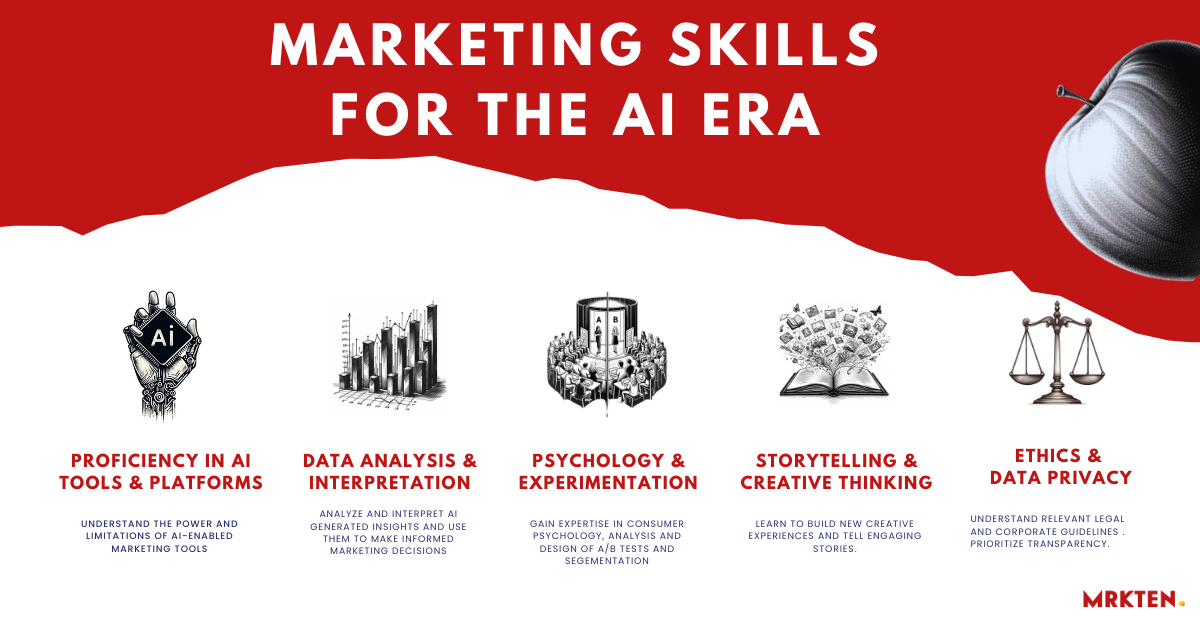Will AI Marketing Jobs Become a Real Thing?
Imagine stepping into a world where digital marketing as we know it has been utterly transformed. Picture this: a world where artificial intelligence (AI) shoulders 95% of the tasks that today’s marketers, strategists, and creatives sweat over. This isn’t just a wild guess; it’s a vision shared by none other than OpenAI’s Sam Altman, causing ripples of panic in the marketing world. But wait, let’s not gallop into despair – no need to enroll for a new marketing degree just yet.
At the heart of marketing is a quintessentially human trait – the art of is persuasion. So before you let gloom cloud your vision, consider this: marketing, at its core, is about connecting, convincing, and converting. Can AI truly replicate the intricate dance of human emotions and impulses that lead to a purchase? Nvidia’s CEO, Jensen Huang might argue that AI’s list of capabilities is indeed impressive—from ideating and strategizing to personalizing content and crunching performance data. But isn’t there something undeniably human about the reasons we choose one product over another?
The future of marketing jobs isn’t about performing tasks faster or more efficiently. No, it’s about understanding the profound and complex reasons behind our choices. It’s about the stories we tell ourselves, the dreams we chase, and the memories we cherish. It’s about empathy, creativity, intuition, and trust—qualities that are the essence of our humanity and still require digital marketing specialists.

The real innovation of AI lies not in productivity improvements but in reimagining possibilities. We’re at the cusp of such a transformation, where AI and machine learning technologies challenge us to rethink our roles and contributions.
The AI marketing roles of tomorrow? They’re not about tasks that AI can automate; they’re about the connections we forge, the experiences we curate, and the human touch we bring to our digital world. Imagine an AI Marketing Conductor who weaves technology, creativity and AI marketing strategy into a cohesive narrative, or an AI Creative Strategist who champions originality and human connection, an Experience Curator who crafts unforgettable moments. The future is ripe with opportunities for those willing to explore uncharted territories of AI-assisted marketing.
How to Future Proof Marketing Skills
To be clear we don’t believe AI will replace marketers but it will require a big shift in focus and skills. Artificial Intelligence’s impact on marketing will become more prevalent in predicting customer desires, personalizing content, targeting with laser precision, and analyzing a sea of insights. You don’t need another degree in marketing to become an AI marketing manager but there are essential skills to nail in the AI era.

Proficiency in AI Tools and Platforms
AI-enabled platforms and tools like Salesforce Einstein or Jasper will act as intelligent partners and change the way marketers work. This enables marketing automation of repetitive tasks, analyzing bigger datasets and crafting precisely targeted campaigns. This newfound focus on AI-enabled marketing frees human marketers to exercise more creative muscle, develop strategic overviews, and build meaningful customer relationships
- Gain experience and familiarity with a wide range of AI platforms
- Understand the power and limitations of AI-enabled marketing tools
- Learn fundamentals around AI, Language models and machine learning
Data Analysis and Interpretation
AI will produce and analyze vast amounts of data, identify trends, and predict future outcomes. This means marketers will all need to become an analytics pro. Learn to interpret data insights and use them to make informed marketing decisions. Become comfortable with these data-driven skills and proficiency in marketing analytics.
- Understanding data types and sources
- Learn how data is collected, cleaned, and structured
- Analyzing data, interpreting insights and strategic thinking
- Visualization and communicating results
Psychology and Experimentation
Ever receive an email that feels like it knows your deepest desire? That’s AI analyzing customer data to craft personalized messages, offers, and recommendations. With AI personalization user experiences will become more powerful and prolific. Marketers will need to become masters in interpreting customer data and use it to craft experiences that feel personal.
- Analysis and design of A/B tests, comparing different versions of marketing materials, website layouts, or email campaigns
- Segmentation to divide customers into distinct groups based on shared characteristics allows for targeted
- Understand omni-channel marketing to integrate customer’s journey across different channels.
- Gain expertise in consumer psychology
Storytelling and Creative Thinking
Writer’s block? AI can be your secret weapon. AI will analyze trends, generate ideas, and create engaging written and visual content. Imagine churning out blog posts, social media captions, comms for public relations and emails that resonate deeply with your audience. Marketers will be the content curator. Hone your skills in identifying high-performing content building creative experience and telling engaging stories. AI generates the drafts, but your human touch adds the magic. Marketing manager roles will become more focused on developing creative ideas and crafting compelling stories.
- Thinking creatively about customer experiences
- Improve storytelling skills like crafting engaging introductions, highlighting key takeaways, and connecting curated content. Excellent communication skills will always be valued.
- Tracking and interpreting metrics and trends around content
- Design skills to re-format content for different scenarios (e.g., summarizing articles, creating social media snippets from videos) while maintaining its core message and value.
- Applying AI to improve complex marketing strategies, campaigns, and funnels
Ethics and Privacy
While generative AI offers a trove of marketing possibilities, it’s crucial to navigate its ethical and security pitfalls. The ability to create compelling content without fact-checking can lead to false or misleading marketing materials, eroding consumer trust. Biases present in the training data can be amplified, perpetuating stereotypes in campaigns. Additionally, security concerns arise when dealing with sensitive customer data used to train models. Marketing process needs to include ethics and data privacy.
- Learn about the limitations and ethical issues of AI
- Get educated about relevant legal and corporate guidelines
- Prioritize transparency to ensure customers understand what AI-generated content is and how their data is used.
- Learn how to test and ensure fairness in training data and responsible use.
So, let’s not fear the growth of AI in the marketing industry its sure to be an exciting challenge. Instead, let’s embrace it as a partner in our creative journey, one that amplifies our human strengths and opens up new horizons for innovation and connection. After all, the future for marketing teams isn’t about replacing humans; it’s about enriching our collective experience with a dash of AI magic. No matter the company size, the job market will still abound with job opportunities for marketers with AI skills.
What do you think the future holds for artificial intelligence marketing?


